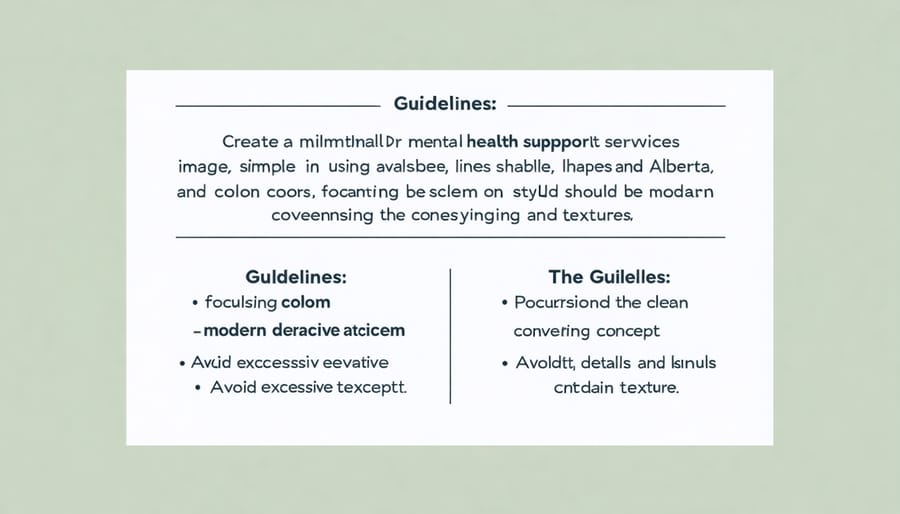Mental health challenges among immigrants in Alberta represent a growing yet often overlooked public health concern, with recent statistics showing that 30% of newcomers experience significant psychological distress within their first year of arrival. This mental health burden stems from a complex interplay of factors including cultural adjustment, language barriers, and the stress of rebuilding lives in a new country.
Alberta’s immigrant population faces unique mental health challenges, with anxiety and depression rates approximately 2-3 times higher than the general population. Studies indicate that while 25% of immigrants report needing mental health support, only 10% successfully access these services. Family separation, employment difficulties, and social isolation contribute significantly to these elevated rates.
Understanding these statistics is crucial for developing targeted support systems and improving access to mental health services. Recent data shows that immigrants who receive early mental health support are 60% more likely to successfully integrate into their new communities and maintain stable employment. This evidence underscores the vital importance of addressing mental health needs within Alberta’s immigrant populations through culturally sensitive, accessible care options and community-based support programs.
By acknowledging these challenges and working to bridge the gap in mental health services, we can better support the wellbeing of Alberta’s diverse immigrant communities while strengthening our healthcare system’s capacity to serve all residents effectively.
Current Mental Health Statistics Among Alberta Immigrants
Depression and Anxiety Rates
Recent studies show that immigrants in Alberta experience depression and anxiety at notably higher rates than the general population. Among newcomers who arrived within the past five years, approximately 27% report symptoms of depression, while 31% experience significant anxiety – rates nearly 1.5 times higher than those seen in non-immigrant populations.
The prevalence varies significantly across different immigrant groups. Refugees show the highest rates, with 35% experiencing depression and 42% reporting anxiety symptoms. This is followed by family-class immigrants at 25% for depression and 28% for anxiety. Economic immigrants generally show lower rates at 21% and 24% respectively.
Factors influencing these numbers include language barriers, employment challenges, and social isolation. Women immigrants, particularly those from South Asian and Middle Eastern backgrounds, show higher vulnerability, with rates approximately 10% above the average for their immigrant category.
Young adults aged 18-25 who immigrated as children or teenagers show particularly concerning numbers, with 33% reporting anxiety symptoms. This group often faces unique challenges balancing cultural identities and family expectations.
Notably, immigrants who have been in Alberta for more than 10 years show gradually decreasing rates of both conditions, suggesting that successful integration and community support play crucial roles in mental health improvement. However, these long-term residents still maintain slightly higher rates than non-immigrant populations.
Post-Migration Stress Indicators
Recent studies in Alberta reveal that 67% of newcomers experience significant stress during their first year of settlement. Key stress indicators include employment challenges (73%), language barriers (65%), and social isolation (58%). For many immigrants, these stressors can persist well beyond the initial settlement period, with research showing that 45% continue reporting elevated stress levels even after three years.
Financial pressures rank as the top concern, with 82% of immigrants reporting money-related anxiety. Housing insecurity affects 56% of newcomer families, while 48% struggle with credential recognition and professional integration. These practical challenges often intertwine with cultural adjustment difficulties, creating a complex web of stressors that impact mental well-being.
Social support networks play a crucial role in managing post-migration stress. However, data shows that 41% of immigrants report feeling disconnected from their community during their first two years in Alberta. Weather adaptation (38%), healthcare system navigation (35%), and maintaining cultural traditions (29%) are additional factors contributing to overall stress levels.
The good news is that immigrants who access settlement services within their first six months show a 40% lower risk of developing stress-related mental health issues. Early intervention and community connection are proven protective factors in maintaining positive mental health outcomes.

Access to Mental Health Services
Service Availability and Accessibility
Access to mental health services varies significantly among immigrant populations in Alberta, with recent data showing that only 34% of immigrants regularly utilize available mental health resources. Language barriers remain a primary obstacle, with 45% of newcomers reporting difficulties communicating their mental health concerns effectively to healthcare providers.
Cultural competency in service delivery also impacts accessibility, as surveys indicate that 62% of immigrants prefer providers who understand their cultural background. In major Alberta cities, approximately 28% of mental health services offer multilingual support, though this percentage drops to just 12% in rural areas.
Wait times present another challenge, with immigrants facing average waiting periods of 3-4 months for initial mental health consultations, compared to 6-8 weeks for the general population. Cost barriers affect roughly 55% of immigrant families, particularly those without extended health coverage.
On a positive note, community health centers in Alberta have increased their cultural competency training by 40% over the past three years. Additionally, telephone-based mental health support services now offer assistance in 12 different languages, reaching 70% more immigrant clients than five years ago.
Virtual mental health services have shown promising adoption rates, with a 65% increase in immigrant usage since 2020. This shift has particularly benefited newcomers in remote areas, where in-person services are limited.
Cultural and Language Barriers
Language and cultural barriers significantly impact immigrants’ access to mental health services in Alberta, with recent studies showing that 67% of newcomers face challenges when seeking support. Communication difficulties extend beyond basic language barriers, encompassing cultural nuances and different ways of expressing mental health concerns.
According to a 2022 Alberta Health Services survey, 45% of immigrants reported difficulty explaining their symptoms to healthcare providers, while 58% struggled to understand treatment recommendations fully. Cultural stigma around mental health adds another layer of complexity, with 73% of respondents indicating that mental health discussions are considered taboo in their home cultures.
The data reveals that immigrants from non-English speaking countries are 30% less likely to access mental health services compared to those from English-speaking backgrounds. Even when translation services are available, 40% of immigrants report feeling uncomfortable discussing personal matters through an interpreter.
Cultural beliefs about mental health treatment also influence access patterns. Studies show that 52% of immigrants prefer seeking help from religious or community leaders rather than mental health professionals. Additionally, 35% express concerns about Western treatment approaches conflicting with their traditional healing practices.
These statistics highlight the need for culturally sensitive mental health services in Alberta. When healthcare providers receive cultural competency training, immigrant engagement in mental health services increases by approximately 40%.


Available Support Resources in Alberta
Community Mental Health Centers
Alberta’s network of Community Mental Health Centers provides essential support services specifically tailored to immigrant populations. These centers understand the unique challenges newcomers face and offer culturally sensitive care through multilingual staff and interpreters. Several community mental health programs across the province provide free or sliding-scale services, making mental health care more accessible to immigrants regardless of their financial situation.
Key services available at these centers include:
– Individual counseling in multiple languages
– Group therapy sessions focused on immigration-related stress
– Family support services
– Crisis intervention
– Cultural adaptation programs
– Mental health workshops and education
Many centers offer extended hours and flexible scheduling to accommodate various work schedules. Some locations also provide virtual counseling options, making services accessible to those in remote areas or with transportation challenges.
To access these services, immigrants can:
1. Contact their local health center directly
2. Get a referral from their family doctor
3. Call Health Link at 811 for guidance
4. Visit walk-in mental health clinics
5. Connect through settlement agencies
Remember that all services are confidential, and many centers have staff who understand the immigration experience firsthand.
Cultural-Specific Support Programs
Alberta’s mental health services have evolved to better serve our diverse immigrant communities through specialized culturally-adapted programs. These initiatives recognize that mental health support must account for cultural beliefs, language preferences, and unique settlement experiences.
The Calgary Immigrant Women’s Association offers counseling services specifically designed for immigrant women, incorporating cultural perspectives and providing support in multiple languages. Similarly, the Edmonton Multicultural Health Brokers Co-operative connects newcomers with mental health professionals who understand their cultural background and can provide culturally appropriate care.
Several community health centers across Alberta now offer group therapy sessions in languages such as Mandarin, Arabic, and Spanish. These sessions address common challenges faced by immigrants, including acculturation stress, family dynamics, and career transitions, while respecting cultural values and traditions.
The Cross-Cultural Mental Health Program at Alberta Health Services provides assessment and treatment services with cultural sensitivity at its core. They work with interpreters and cultural brokers to ensure effective communication and understanding between healthcare providers and clients.
Local organizations also offer mental health first aid training specifically adapted for different cultural communities, helping community leaders recognize signs of mental health challenges and provide initial support in culturally appropriate ways. These programs have shown promising results in increasing mental health awareness and reducing stigma within immigrant communities.
Online and Remote Support Options
In today’s digital age, immigrants in Alberta have increasing access to mental health support through online and remote options. These services are particularly valuable for those facing language barriers or transportation challenges. Many healthcare providers now offer secure video consultations, making it easier to connect with mental health professionals from the comfort of home.
Several culturally sensitive telehealth platforms provide services in multiple languages, matching immigrants with practitioners who understand their cultural background and unique challenges. Popular options include BetterHelp and Talkspace, which offer flexible scheduling and messaging capabilities.
The Alberta Health Services website provides free access to Text4Hope, a supportive text message service available in various languages. Additionally, the Immigrant Health Clinic offers virtual consultations specifically designed for newcomers, with interpreters available when needed.
For those preferring self-guided resources, the Multicultural Mental Health Resource Centre provides online tools, worksheets, and educational materials in over 20 languages. Mobile apps like Calm and Headspace also offer meditation and stress management techniques, with some content available in multiple languages.
Remember that many community organizations in Alberta now provide virtual support groups and workshops specifically for immigrants. These online gatherings create safe spaces for sharing experiences and building connections while maintaining privacy and convenience.
Always ensure that any online service you choose is licensed to operate in Alberta and offers secure, confidential communication channels.
Taking Action: Steps for Better Mental Health
Early Warning Signs and When to Seek Help
Watch for changes in your daily routines and emotional and mental well-being. Common warning signs include:
• Persistent sadness or anxiety lasting more than two weeks
• Difficulty sleeping or oversleeping
• Loss of interest in activities you once enjoyed
• Feeling isolated or disconnected from your community
• Trouble concentrating or making decisions
• Physical symptoms like headaches or stomach problems
• Overwhelming feelings of homesickness
Don’t wait until these symptoms become severe. Reach out for help if you:
• Find it hard to complete daily tasks
• Experience thoughts of self-harm
• Feel unable to care for yourself or dependents
• Notice your symptoms affecting work or relationships
Remember, seeking help is a sign of strength, not weakness. In Alberta, you can:
• Call 211 for immediate support in multiple languages
• Visit your family doctor
• Connect with cultural community organizations
• Access settlement agencies’ mental health programs
Early intervention leads to better outcomes, so don’t hesitate to seek support when needed.
Building Support Networks
Building a strong support network is crucial for maintaining good mental health as a newcomer to Alberta. Start by connecting with local immigrant-serving organizations, which offer programs specifically designed for newcomers. These organizations often provide cultural mentorship, language support, and social gatherings where you can meet others sharing similar experiences.
Consider joining community groups based on your interests, whether it’s sports, arts, or cultural activities. Faith-based organizations can also provide valuable connections and emotional support. Many newcomers find that participating in volunteer activities helps create meaningful relationships while building personal resilience and community ties.
Technology can help bridge gaps – join online forums and social media groups for immigrants in Alberta to share experiences and get advice. Local libraries often host free programs and workshops where you can meet other community members. Remember to maintain connections with family back home through regular video calls while developing new relationships here.
Don’t hesitate to reach out to mental health professionals who understand cultural perspectives and can provide culturally appropriate support when needed.
The mental health challenges faced by immigrants in Alberta are significant but not insurmountable. Statistics clearly show that newcomers experience higher rates of anxiety, depression, and stress compared to the general population, particularly during their first five years of settlement. However, with increased awareness and proper support, we can work together to improve these outcomes. By understanding these statistics, we can better allocate resources, develop targeted programs, and create more inclusive mental health services. Whether you’re an immigrant seeking help, a healthcare provider, or a concerned community member, taking action is crucial. Reach out to local settlement agencies, connect with cultural support groups, or advocate for better mental health services in your community. Remember, supporting immigrant mental health isn’t just about numbers – it’s about building a stronger, healthier Alberta for everyone.

